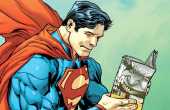Karen
I read too many books, write fiction, blog, and eat a lot of chocolate. I'm currently completing a Publishing Certificate to become a full-time editor.
Contributor I
- Lurker
- Pssst
- Sharp-Eyed Citizen
- Town Watch
- Detective Deskman
- Article of the Month
- ?
- Articles
1 - Featured
1 - Comments
21
- Ext. Comments
13 - Processed
24 - Revisions
21
- Topics
4 - Topics Taken
1 - Notes
12
- Topics Proc.
29 - Topics Rev.
7
- Points
869 - Rank
138 - Score
518
Latest Articles
Latest Topics
Complex morality in V.E. Schwab's ViciousVicious can be summed up as two brilliant and ambitious college friends who get their own superhero origins by deliberately manufacturing near-death experiences that (if survived) will let them become "ExtraOrdinary." With their newfound powers, Victor and Eli find themselves on opposing sides, each now capable of doing inhuman things. As the story progresses, it becomes incredibly difficult to categorize either character as a complete hero or villain because their causes are a conflict of both right and wrong. Analyze Eli and Victor’s philosophies of morality (particularly after they become EOs) and why they believe they are each justified to act as they do. Eli’s occupation with religion will be helpful here. Also look at how they involve and treat other people in their plans (like Angie, Sydney, or Serena). |
The Women of The Bold TypeThe first season of The Bold Type just concluded and it has received overwhelmingly positive reviews from critics and viewers alike. For a show predicated on the lives of three young women – Jane, Sutton, and Kat – working at a women’s magazine, the writers could have easily made its characters vapid and its plot shallow or overly predictable, or pit the three females together in competition with each other. Instead, these women each occupy their own department within the magazine and only ever try to support each other as they navigate their love lives, sexuality, jobs, and identities. |
The Use of Music in Baby DriverAnalyze the use of music in the film. The music Baby listens to becomes a major part of the movie’s score and also serves to punctuate many of the film’s amazing chase sequences; it is often synced perfectly to the action, as Baby is meticulous in timing the music just right. A film’s score is always deliberately attuned to the story’s plot and themes, but do the musical choices, timing, and the fact it is usually coming from a character’s iPod produce a new or different effect upon the viewer?
|
Being Above the Law in "How to Get Away With Murder"Analyze the issue of the show’s main characters being involved in law yet acting above it (i.e. through murders, blackmailing, theft). What are the implications of this hypocrisy and how can this form a commentary on modern society or human nature? How is the show so appealing despite the characters going against simple black-and-white laws most people have been raised to instinctively follow? How can we condemn real-life criminals, yet root for these fictional ones as they do the exact same thing? Do the characters’ backstories inform and alter our perspective of them, humanizing them so it becomes more difficult to see them as villains?
|
Latest Comments
| The Anime Dub Controversy | |
I used to love the Kingdom Hearts series growing up, replaying whichever games I had every year. But I *hated* the beginning of Kingdom Hearts 2, which felt like one big tutorial until you gained control of Sora for the first time. | Video Games And—Wait, Another Darn Tutorial? |
Thank you for your comment! I loved McCloud’s books – definitely useful for anyone wishing to explore how comics are structured! | Comic Books, Adults, and a History of Stigmatization |
Hiya, I’m Canadian too, and I would definitely encourage you to read it! I actually read it last year for a university science class, and it was really eye-opening. I think this article captures Atwood’s effectiveness at depicting such a terrifying world that tips into ethically gray areas for genetics and government power. | Oryx and Crake: Why Atwood Matters |
All great suggestions, and a wonderful way of breaking down just how graphic novels offer an assortment of genres to such a wide variety of people. It’s almost overwhelming to pick *one* graphic novel to start with if you’re new to it, but I definitely agree that there’s something out there for everyone. | Comic Books, Adults, and a History of Stigmatization |
I adored Nimona! I think it’s very aware of itself as a graphic novel, and a decent starter for anyone wishing to get into the medium. | Comic Books, Adults, and a History of Stigmatization |
Well put! | Comic Books, Adults, and a History of Stigmatization |
It’s a shame you’ve had these experiences – and that these people have a narrow understanding of the wonderful content of comic books. It’s certainly an example that helps prove my point here. | Comic Books, Adults, and a History of Stigmatization |

I love this article! I used to watch a lot of anime and tended toward the dubs when I was younger, but I did find that I preferred reading subtitles (especially when some animes had really awful dubbing). I will watch some animes in English, like Death Note and FullMetal Alchemist, mostly because I genuinely like the English voice acting and don’t feel like the story is changed for localization.